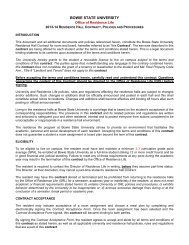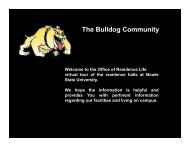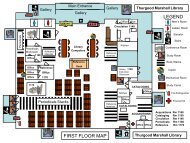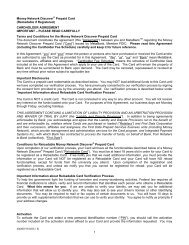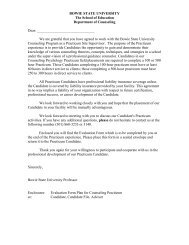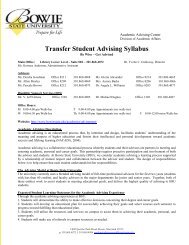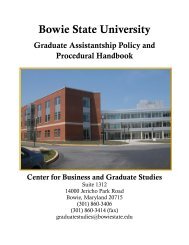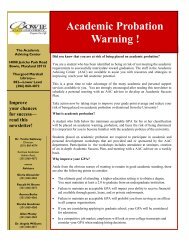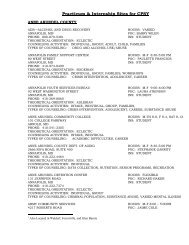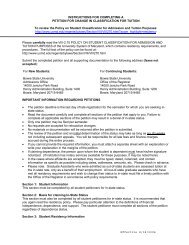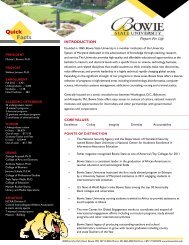2009-2010 - Bowie State University
2009-2010 - Bowie State University
2009-2010 - Bowie State University
You also want an ePaper? Increase the reach of your titles
YUMPU automatically turns print PDFs into web optimized ePapers that Google loves.
ECON‐373 ENVIRONMENTAL AND RESOURCE ECONOMICS (Spring) 3 credits<br />
Prerequisite: ECON‐211 and ECON 212 or instructor’s permission: This course explores the origins of environmental problems, how to measure<br />
the value of environmental amenities, and the efficacy of specific forms of regulation, including mandated technologies, taxes, subsidies, and<br />
pollution permit trading. Topics include air and water pollution, climate change, the transition from fossil fuels to renewable energy sources,<br />
and sustainable development.<br />
ECON‐383 ECONOMICS OF POVERTY AND INCOME DISTRIBUTION (Spring Only) 3 Credits<br />
Prerequisite: ECON‐211 and ECON 212 or instructor’s permission: This course explores how economics can be used to explain and analyze the<br />
concepts, causes and effects of poverty and income inequality on various population groups. It will introduce students to the relevant economic<br />
theories of poverty and inequality and use empirical facts to define and measure poverty and inequality and assess the effectiveness of policies<br />
aimed at combating poverty and inequality in the United <strong>State</strong>s and the developing world.<br />
ECON‐400 SPECIAL TOPICS IN ECONOMICS (Fall, Spring, Summer) 3 credits<br />
To be approved by Department Chair and Instructor. This course will involve a wide spectrum of special topics in economic policy with one<br />
selected for each semester in which it is offered. Topics will cover a range of issues of concern to and debated in the society. They will be<br />
chosen based on the interests of students in the Business Administration program as a whole and Economics, in particular, and the different<br />
instructors’ area of specialization. Examples of such topics include Crises in the Financial Market, The Housing Market, Global Warming,<br />
Globalization, Trade Policy, Race and Gender Discrimination, Health Care Policy, Social Security, Regulation versus Deregulation, Environmental<br />
Policy, Education Policy, Labor and Industrial Organization, among others<br />
ECON‐412 INDUSTRIAL ORGANIZATION (Fall) 3 Credits<br />
Prerequisite: ECON‐211 and ECON 312<br />
This is an advanced course in undergraduate Industrial Organization. Industrial Organization is essentially a branch of applied Microeconomics,<br />
which seeks to understand the causes and effects of various market structures on pricing and product choice. We focus on the behavior of firms<br />
in imperfectly competitive markets, which appear to be far more common than the perfectly competitive markets. Topics include price<br />
discrimination, oligopolistic competition, network externalities, collusion through contractual arrangements, advertising. Some introductory<br />
topic in Game Theory will be introduced<br />
ECON 421 URBAN ECONOMICS (Fall Only) 3 CREDITS<br />
Prerequisite(s): ECON 211 and ECON 212. This course examines the economic base of urban areas and how these bases are related to<br />
employment, population, economic growth, and the economic and social structure. This course also is designed to analyze the economic<br />
aspects of the most pressing urban problems, including housing, transportation, municipal finance, poverty, urban services, and the<br />
environment.<br />
ECON 422 PUBLIC FINANCE AND BUDGETING (Spring Only) 3 CREDITS<br />
Prerequisite(s): ECON 211 and ECON 212. This course is a survey of the welfare implications of government expenditures, revenues and debt<br />
systems in view of principles of taxation and the criteria for public expenditures, with special reference to allocation, stabilization, and<br />
redistribution functions of the public sector.<br />
ECON 423 MONETARY AND FISCAL POLICY (Spring Only) 3 CREDITS<br />
Prerequisite(s): ECON 321. This course is a study of the Monetarist and Keynesian Models and their applications to monetary and fiscal<br />
stabilization policies for the nation's economy.<br />
ECON 448 MANAGERIAL ECONOMICS (Fall Only) 3 CREDITS<br />
Prerequisite(s): ECON 211 and ECON 212. This course is a study of the economic aspects of the managerial decision making process in various<br />
market structures, with special emphasis on quantitative analysis.<br />
ECON 483 QUANTITATIVE METHODS DM (Fall, Spring) 3 CREDITS<br />
Prerequisite(s): ECON 351. This course is a study of the quantitative techniques common in decision‐making, with emphasis on application.<br />
Topics discussed include decision‐making and decision analysis, linear programming, transportation and assignment problems, forecasting and<br />
time‐series analysis, inventory concepts, and mathematical simulation.<br />
ECON 493 ELEMENTS OF ECONOMETRICS (Spring) 3 credits<br />
Prerequisite: ECON‐211, ECON 212 and ECON 351<br />
Introduction to Econometrics is a course that will focus on the development and application mathematical and statistical method to estimating<br />
the relationship between and testing the validity of economic theory. ECON‐451 is an introductory course in Econometrics Methods.<br />
Elementary econometric models and techniques will be introduced in this course. Students are expected to acquire the skills necessary to do<br />
conduct regression analysis with real economic data. Computer programs such as SPSS, STATA, MINITAB, and Microsoft Excel will be used for<br />
running real‐world problems.<br />
ECON 498 ECON FOR ADM MGMT 3 (For graduate students only)<br />
EDUC: EDUCATION COURSE DESCRIPTIONS<br />
EDUC 101 INTRO TO EDUCATION 3 CREDITS<br />
This course provides an overview of American public education, the teaching profession, and contemporary issues that impact on public<br />
education. Students must also enroll concurrently in EDUC 102 Practicum I.<br />
<strong>Bowie</strong> <strong>State</strong> <strong>University</strong> 353




